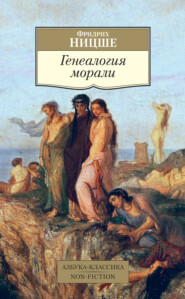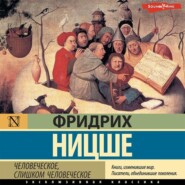По всем вопросам обращайтесь на: info@litportal.ru
(©) 2003-2024.
✖
We Philologists
Настройки чтения
Размер шрифта
Высота строк
Поля
People really do compare our own age with that of Pericles, and congratulate themselves on the reawakening of the feeling of patriotism: I remember a parody on the funeral oration of Pericles by G. Freytag,[9 - See note on p 149. (#x_2_i43)– Tr.] in which this prim and strait-laced "poet" depicted the happiness now experienced by sixty-year-old men. – All pure and simple caricature! So this is the result! And sorrow and irony and seclusion are all that remain for him who has seen more of antiquity than this.
97
If we change a single word of Lord Bacon's we may say. infimarum Græcorum virtutum apud philologos laus est, mediarum admiratio, supremarum sensus nullus.
98
How can anyone glorify and venerate a whole people! It is the individuals that count, even in the case of the Greeks.
99
There is a great deal of caricature even about the Greeks · for example, the careful attention devoted by the Cynics to their own happiness.
100
The only thing that interests me is the relationship of the people considered as a whole to the training of the single individuals · and in the case of the Greeks there are some factors which are very favourable to the development of the individual. They do not, however, arise from the goodwill of the people, but from the struggle between the evil instincts.
By means of happy inventions and discoveries, we can train the individual differently and more highly than has yet been done by mere chance and accident. There are still hopes. the breeding of superior men.
101
The Greeks are interesting and quite disproportionately important because they had such a host of great individuals. How was that possible? This point must be studied.
102
The history of Greece has hitherto always been written optimistically.
103
Selected points from antiquity: the power, fire, and swing of the feeling the ancients had for music (through the first Pythian Ode), purity in their historical sense, gratitude for the blessings of culture, the fire and corn feasts.
The ennoblement of jealousy: the Greeks the most jealous nation.
Suicide, hatred of old age, of penury. Empedocles on sexual love.
104
Nimble and healthy bodies, a clear and deep sense for the observation of everyday matters, manly freedom, belief in good racial descent and good upbringing, warlike virtues, jealousy in the ἁριστεὑειν, delight in the arts, respect for leisure, a sense for free individuality, for the symbolical.
105
The spiritual culture of Greece an aberration of the amazing political impulse towards ἁριστεὑειν. The πὁλις utterly opposed to new education; culture nevertheless existed.
106
When I say that, all things considered, the Greeks were more moral than modern men what do I mean by that? From what we can perceive of the activities of their soul, it is clear that they had no shame, they had no bad conscience. They were more sincere, open-hearted, and passionate, as artists are; they exhibited a kind of child-like naiveté. It thus came about that even in all their evil actions they had a dash of purity about them, something approaching the holy. A remarkable number of individualities: might there not have been a higher morality in that? When we recollect that character develops slowly, what can it be that, in the long run, breeds individuality? Perhaps vanity, emulation? Possibly. Little inclination for conventional things.
107
The Greeks as the geniuses among the nations.
Their childlike nature, credulousness.
Passionate. Quite unconsciously they lived in such a way as to procreate genius. Enemies of shyness and dulness. Pain. Injudicious actions. The nature of their intuitive insight into misery, despite their bright and genial temperament. Profoundness in their apprehension and glorifying of everyday things (fire, agriculture). Mendacious, unhistorical. The significance of the πὁλις in culture instinctively recognised, favourable as a centre and periphery for great men (the facility of surveying a community, and also the possibility of addressing it as a whole). Individuality raised to the highest power through the πὁλις. Envy, jealousy, as among gifted people.
108
The Greeks were lacking in sobriety and caution. Over-sensibility, abnormally active condition of the brain and the nerves; impetuosity and fervour of the will.
109
"Invariably to see the general in the particular is the distinguishing characteristic of genius," says Schopenhauer. Think of Pindar, &c. – "Σωφροσὑιη," according to Schopenhauer, has its roots in the clearness with which the Greeks saw into themselves and into the world at large, and thence became conscious of themselves.
The "wide separation of will and intellect" indicates the genius, and is seen in the Greeks.
"The melancholy associated with genius is due to the fact that the will to live, the more clearly it is illuminated by the contemplating intellect, appreciates all the more clearly the misery of its condition," says Schopenhauer. Cf. the Greeks.
110
The moderation of the Greeks in their sensual luxury, eating, and drinking, and their pleasure therein; the Olympic plays and their worship. that shows what they were.
In the case of the genius, "the intellect will point out the faults which are seldom absent in an instrument that is put to a use for which it was not intended."
"The will is often left in the lurch at an awkward moment: hence genius, where real life is concerned, is more or less unpractical – its behaviour often reminds us of madness."
111
We contrast the Romans, with their matter-of-fact earnestness, with the genial Greeks! Schopenhauer: "The stern, practical, earnest mode of life which the Romans called gravitas presupposes that the intellect does not forsake the service of the will in order to roam far off among things that have no connection with the will."
112
It would have been much better if the Greeks had been conquered by the Persians instead of by the Romans.
113
The characteristics of the gifted man who is lacking in genius are to be found in the average Hellene – all the dangerous characteristics of such a disposition and character.
114
Genius makes tributaries of all partly-talented people: hence the Persians themselves sent their ambassadors to the Greek oracles.
115
The happiest lot that can fall to the genius is to exchange doing and acting for leisure; and this was something the Greeks knew how to value. The blessings of labour! Nugari was the Roman name for all the exertions and aspirations of the Greeks.
No happy course of life is open to the genius, he stands in contradiction to his age and must perforce struggle with it. Thus the Greeks. they instinctively made the utmost exertions to secure a safe refuge for themselves (in the polis). Finally, everything went to pieces in politics. They were compelled to take up a stand against their enemies. this became ever more and more difficult, and at last impossible.
116

















